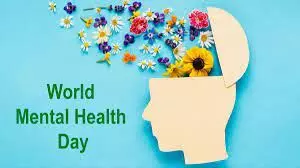- Home
- /
- Features/Spotlight
- /
- How to manage mental...
How to manage mental health condition amid stigma and discrimination

A social worker simply identified as Adelayo Ojo will always recall a mental health condition of a woman — Mercy — whose condition could have been improved by her neighbours’ goodwill and care.
Amid contempt, isolation, stigma and neglect, Mercy thinks she has suffered more from inhuman behaviours in her society than receiving mercy — her name.
Imagining her situation, Ojo says Mercy has gone through a difficult time in her life not only for her mental health condition but more arising from the public attitudes to her challenge.
According to Ojo, Mercy is going through Puerperal Psychosis, a post-natal mental illness involving the malfunctioning of the sufferer’s cognitive system.
“The situation usually happens to some people after giving birth, such persons go through depression, and it makes them feel as though they want to harm themselves or their baby or that somebody wants to harm them.
“They are disinterested in issues of life. These set of people experience sadness instead of the joy of giving birth that usually accompanies deliveries of new lives. They experience failure and are beside themselves.
“Mercy’s issue started after three months of having her second child. It began subtly but it needs a thoughtful family member around to identify it most times, but she has not got that’’, Ojo observes.
In a critical occasion, Ojo says Mercy started after having issues with her husband and in the course of one of the arguments, she poured soup on him and ran out.
“This is enough for her husband or any other family member to know that something is wrong with her since she has not exhibited such behaviour previously,’’ she notes.
Mercy got to know Ojo in a commercial vehicle and identified her when she noticed that she was talking and smiling to herself.
She would later take Mercy to a social welfare centre from where she was referred to appropriate hospital for treatment.
Ojo later contacted mercy’s family and children began to receive treatment even for her child; but Mercy needs more social support which is essential for people going through mental health issues.
Mercy’s case is one out of numerous of such illness globally in which observers note that one out of eight people in the country could present indications of mental health condition, anxiety and depression.
Observers also express concerns that the number of people with mental health issues has increased significantly since COVID-19 and with the present economic situation; the situation would have gone worse.
Ojo believes that apart from finance as impediment to virile treatment of the condition, social interaction, care by neighbours, showing compassion, giving the sufferers the assurance of acceptability, hope and reintegration, among others, are germane to healing process of the mental health conditions.
Managing mental health condition is cardinal to the World Federation for Mental Health, a global mental health organisation devoted to promoting mental well-being across the world on every October 10.
The observance of the day would show that everyone has mental health and that they are not alone if ever they are dealing with overwhelming feelings; raising awareness of mental health issues around the world and mobilising efforts in support of mental health.
World Mental Health Day observance is indeed education, awareness and advocacy against social stigma.
The awareness from groups and international organisations, notwithstanding, Ojo observes that people tend to look down on sufferers of mental illness.
“The government needs to create resources for health institutions to cater for the mental health needs of its citizens.
“Indeed, there is a need to join hands in raising awareness of mental health issues by all as a way to start removing the barriers, especially the stigma and discrimination,’’ she said. Similarly, Asido Foundation, a not-for-profit mental health advocacy organisation in Ibadan notes that 80 per cent treatment-gap exists in persons with mental health.
The founder of the organisation, Dr Jibril Abdulmalik says that misconception and stigmatisation of the illness have not helped in proper medical treatment of the illness.
He observes that human rights abuses of affected persons such as shame, stigma and discrimination due to lack of ignorance.
“The societal impact of mental ill-health includes human rights abuses, stigma and discrimination, beliefs in supernatural disease causation, drug abuse and insecurity, few mental health professionals as well as reduced access to care, which is the treatment gap.”
Abdulmalik also underscores the need to promote mental health awareness as the world celebrates the World Mental Health Day with the theme: “Mental health is a universal human right’’.
By Ibukun Emiola



